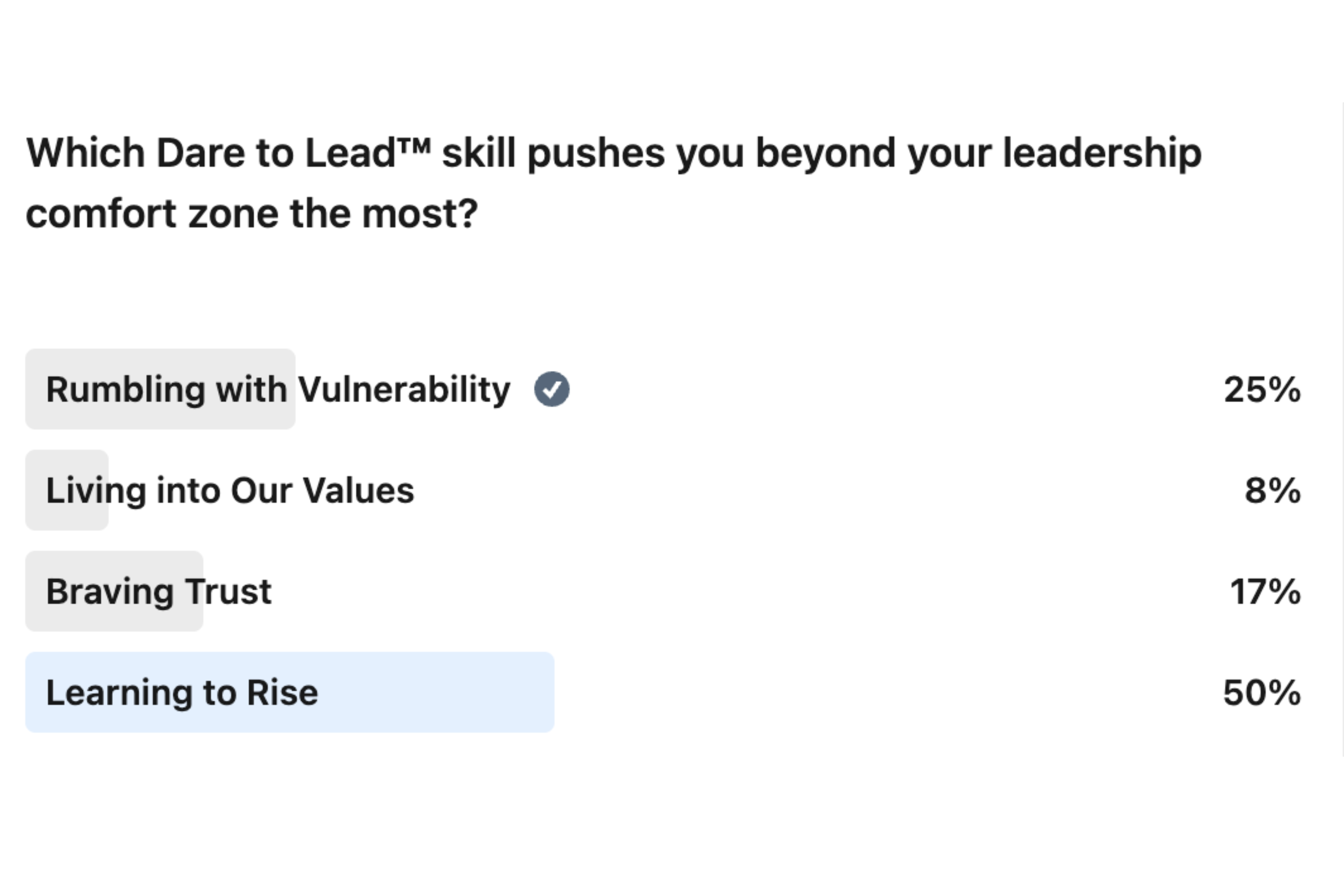This Skill Pushes Leaders the Most Beyond their Comfort Zone
Your courageous leadership has the power to drive lasting change, and we're committed to supporting you every step of the way.
Based on the research of Dr. Brené Brown, the Dare to Lead™ program emphasizes four skill sets that foster courageous leadership: Rumbling with Vulnerability, Living into Our Values, Braving Trust, and Learning to Rise. Each principle is pivotal in creating a psychologically safe workplace that fosters a culture of care and employee mental health.
Our recent LinkedIn poll asked, "Which Dare to Lead™ skill pushes you beyond your leadership comfort zone the most?"
50% of the leaders identified "Learning to Rise" as the skill that pushed them past their comfort zones the most. This statistic underscores its transformative potential and has prompted us to delve deeper into each of the four Dare to Lead™ skills.
Through this special Courageous Leadership & Mental Health blog series, we'll examine each skill in the order of their perceived level of challenge, as indicated by the leaders who participated in the poll.
Navigating the 3 Steps of Brené Brown's 'Learning to Rise' Journey in the Workplace
‘Learning to Rise’ follows a three-step process:
The Reckoning (getting curious about your emotions)
The Rumble (getting honest with the stories that you are making up)
The Revolution (transforming the setback)
In the current landscape, leaders often face an increasingly heavy load. Budget cuts, layoffs, employees quitting, unmanageable workloads, tight deadlines, and the challenges of launching new programs are typical workplace stressors that can challenge a leader's emotional resilience. Furthermore, leaders are tasked with managing the complexities of the post-pandemic world at work.
While some leaders might power through these challenges, many are left drained, with little energy in reserve. Adding to this strenuous situation is the rise of mental health incidences among employees, resulting in a ‘perfect storm’ scenario. We often hear this narrative when we engage with new, existing, and potential clients. Leaders find themselves ill-equipped to support their employees' mental health due to a lack of training and time. This presents a significant setback – and is prime for the leader to implement ‘The Reckoning’. Grappling with workload pressures, they may overlook critical indicators of their employees' mental health. This oversight can have profound repercussions.
The Reckoning presents an opportunity for the leader to do their own internal work and get curious about their own emotional state. Most of us were never taught to experience our emotions. This is an essential step that involves connecting to what they’re feeling, naming the emotion and catching where the emotion is presenting within their body. All necessary to support the Learning to Rise process.
A recent article from Harvard Business Review discusses findings from various studies, highlighting that leaders who demonstrate resilience can significantly bolster their employees' well-being. This improvement, in turn, results in enhanced productivity and an overall uplift in team morale. This research becomes even more relevant considering evidence from a recent study indicating that managers exert a profound influence (both positive and negative) on their employees' mental health - a level of impact that can often surpass that of a therapist or family member.
Consider this scenario:
An employee misses a deadline, and a leader might focus on compliance, missing an opportunity to investigate the root cause. This is ‘The Rumble’ stage, a crucial point where the leader needs to question their dominant narrative and dig deeper. Could the missed deadline be due to the employee struggling with a personal matter?
If a leader fails to take this step, they may misinterpret the situation, leading to misconceptions about the employee's commitment to work. This narrow view can limit the potential to promote a healthier, more supportive workplace where employees feel seen and heard.
In the face of such challenges, the call to action is for leaders to bravely step into 'The Revolution' stage. In this stage, leaders can transform the setback into an opportunity for growth and understanding. By checking in with their employees, leaders can encourage open communication, leading to insights into their employees' concerns and feelings. This simple yet powerful action can enable leaders to adjust or reassign priorities as needed.
The transformation offered by the Learning to Rise process allows leaders to effectively navigate the complex landscape of the modern workplace. The resulting culture of care and empathy can lead to healthier, happier, and more productive teams.
Intrigued by what you've read and looking to bring this transformation to your team or perhaps for yourself?
Stay tuned for our upcoming newsletter, where we'll dive deeper into these insights. If you're eager to start your 'Learning to Rise' journey right away, we've got exciting news! We will be sharing a comprehensive, user-friendly guide that can help you navigate this transformative process. Our interactive guide will provide you with real-life scenarios and prompts to help apply the 'Learning to Rise' model in your daily work, challenging your perceptions about mental health and enhancing your leadership resilience. Be sure to subscribe to our newsletter to access this downloadable guide.
If you haven’t subscribed to our Support Your People Newsletter, here's what you're missing out on:
Staying updated on the latest developments in the mental health industry;
Access valuable resources and tips;
Research-based case studies written by our team of experts; and
Comprehensive training programs and other services that will help you connect with those who matter the most, YOUR PEOPLE!
Sign up for the Support Your People Newsletter here: https://www.supportyourpeople.com/contact#signup
We’re here to help.
If your organization wants to build courageous leaders who are not afraid to have tough conversations, our qualified experts are ready to guide and support you.
For a deeper dive into our approach, contact us at info@mhic-cism.com to book a complimentary "Daring Leadership Culture Consultation." This one-on-one session will help identify if our program is a good fit for your organization.


